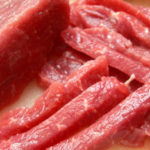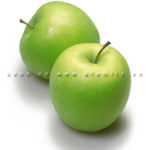In addition to boiled chicken and dishes, the fruit platter is also extremely important on the altar for the Kitchen God. Join us in exploring the types of fruits that are commonly offered to the Kitchen God, along with their significance, in the article below!
1 Significance of Worshipping the Kitchen God
Worshipping the Kitchen God is a long-standing tradition in Vietnamese culture. According to folk beliefs, the Kitchen God oversees all activities of the household, warding off evil spirits and maintaining peace for the family members. This worship ritual carries the meaning of praying for a prosperous and harmonious family life. Additionally, it also involves the worship of the “Stove God”, who is believed to govern the kitchen and cooking activities.
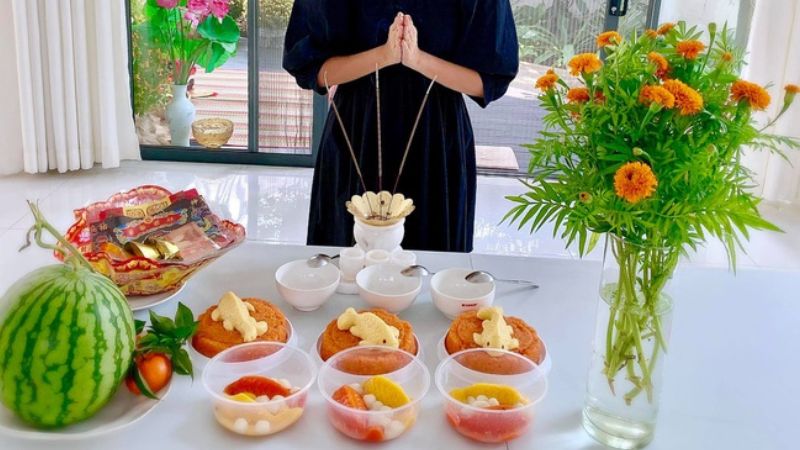 Significance of Worshipping the Kitchen God
Significance of Worshipping the Kitchen God
2 Can We Offer Fruits to the Kitchen God?
Many people wonder what the altar for the Kitchen God should include, and if offering fruits is acceptable. The answer is yes, and the fruit platter plays a significant role in the worship ritual. The types of fruits offered may vary depending on the region.
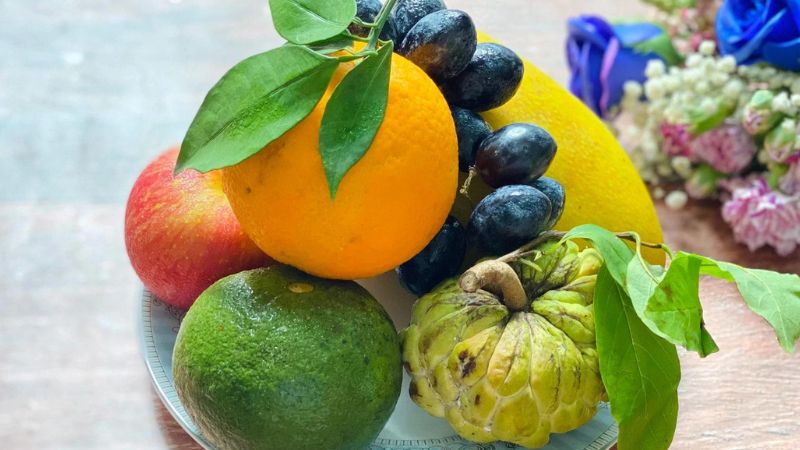 Can We Offer Fruits to the Kitchen God?
Can We Offer Fruits to the Kitchen God?
3 Fruits for the Kitchen God’s Ascension to Heaven
Fruits Offered in Northern Vietnam
In Northern Vietnam, the fruit platter for the Kitchen God typically includes: dragon fruit, mango, jackfruit, lychee, longan, banana, apple, pear, and pomelo.
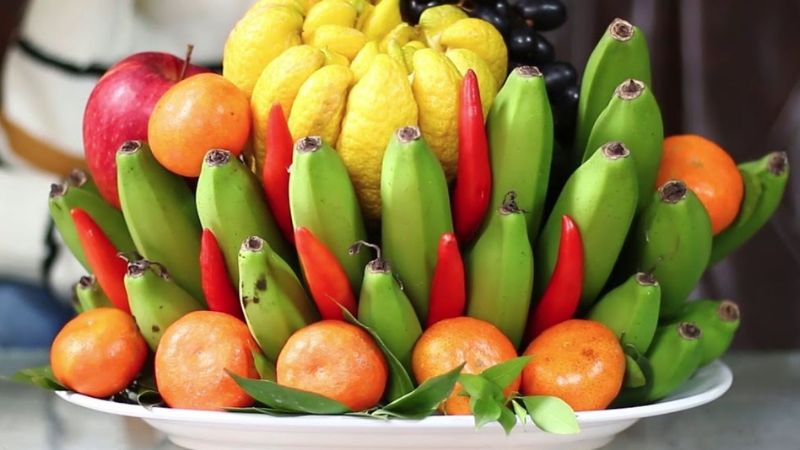 Fruits Offered in Northern Vietnam
Fruits Offered in Northern Vietnam
Fruits Offered in Central Vietnam
In Central Vietnam, the fruit platter may consist of bananas, dragon fruit, jackfruit, mangoes, oranges, tangerines, and other seasonal fruits. The specific types of fruits offered are not mandatory and may vary.
 Fruits Offered in Central Vietnam
Fruits Offered in Central Vietnam
Fruits Offered in Southern Vietnam
In Southern Vietnam, the altar for the Kitchen God often features tropical fruits such as papaya, mango, jackfruit, pineapple, and grapes. Unlike other regions, people in Southern Vietnam avoid certain fruits due to their names being considered unlucky, such as bananas, apples, pears, tangerines, and oranges.
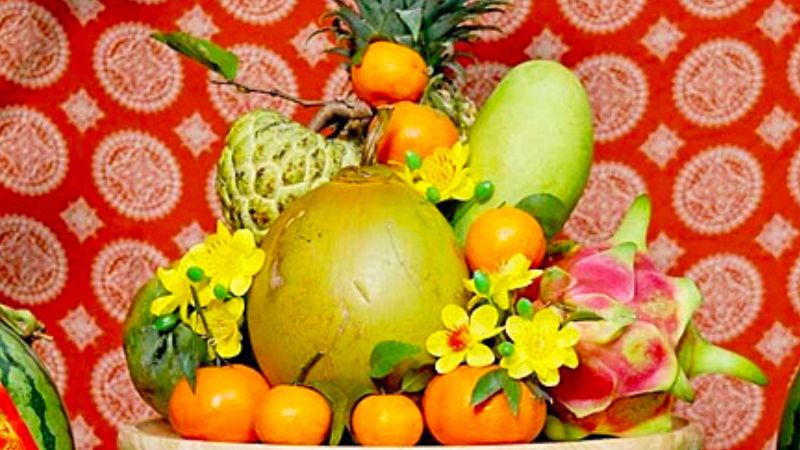 Fruits Offered in Southern Vietnam
Fruits Offered in Southern Vietnam
4 Fruits to Avoid When Worshipping the Kitchen God
To prevent bad luck and misfortune for the household, it is important to avoid offering the following types of fruits when worshipping the Kitchen God:
- Artificial fruits: Offering artificial fruits is considered disrespectful and deceitful to the deities.
- Fruits that grow close to the ground: These fruits are more likely to be contaminated and affected by negative energies, creating an unpleasant atmosphere.
- Fruits with strong, pungent odors can disrupt the harmonious atmosphere within the family.
- Fruits with sharp thorns such as durian, pineapple, and jackfruit can negatively impact the peace, wealth, and happiness of the household.
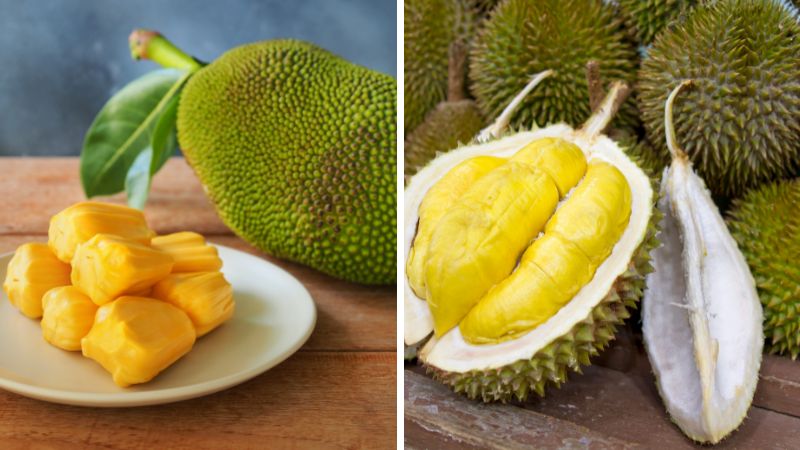 Fruits to Avoid When Worshipping the Kitchen God
Fruits to Avoid When Worshipping the Kitchen God
5 Notes on Offering Fruits on the Kitchen God’s Altar
To demonstrate sincerity and respect, keep the following points in mind when offering fruits on the Kitchen God’s altar:
- You can offer a platter of five different types of fruits or a single type of fruit.
- The number of fruits on the platter should be odd, as odd numbers are believed to represent the underworld.
- The fruits should be fresh, juicy, and vibrant in color, free from any bruises or damage.
- It is advisable to select the fruits one to two days before the worship ritual to ensure they remain fresh and avoid overripening.
- Do not offer bruised or damaged fruits as it shows a lack of respect and reverence to the deities.
 Notes on Offering Fruits on the Kitchen God’s Altar
Notes on Offering Fruits on the Kitchen God’s Altar
The aforementioned fruits are considered appropriate and meaningful offerings for the Kitchen God. We hope this article has provided you with a better understanding of the types of fruits typically offered during this traditional worship ritual!
Expert Advice on How to Identify Unsafe Food
Are you aware of how to inspect food for possible safety risks? With the presence of food products from unclear origins and chemicals used as preservatives, it is important to be vigilant in selecting food items for our families. Join us in the Food Tips section to take a closer look at how to select safe and healthy food for our families!

























